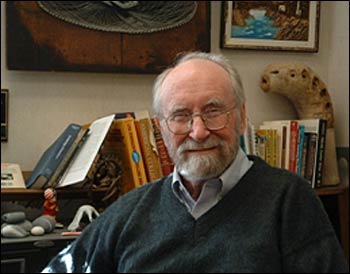In Memoriam
by Marcus Braybrooke
The sudden death of Hal French this past July 10, at the age of 84, was a shock and sadness to his many friends around the world. He was a gentle giant among the pioneers who have opened the doors to interfaith culture over the past half century. We express our deep sympathy to his wife Rannee and the family.

I first met Dr. Harold W. French in the nineteen-seventies at the headquarters of the Theosophical Society at Adyar in South India. We were both already deeply influenced by Sri Ramakrishna’s claim that in experiencing the Divine, one transcends one’s particular chosen spiritual path – a claim broadcast to the world by Swami Vivekananda at the 1893 World Parliament of Religions.
We were also influenced by William Ernest Hocking, who listened to Vivekanada at the Parliament and suggested that members of world religions would move closer to each other, partly through direct encounter, but even more in responding to the challenges of the modern world. These included the growing attention to gender inequality, threats to the environment, and the dangers of religious extremism, issues Hal was already warning of in the late nineteen-eighties. He published A Study of Religious Fanaticism and Responses to It in 1990.
Subsequently we spent time in each other’s homes. Hal was with us when his mother died, and it was a special moment when we went together to the early communion service at beautiful Wells Cathedral. Hal invited Mary and me to take part in a pre-Parliament of Religions event at Columbia in 1992. He spoke of our ‘warm collegiality in shared interfaith concerns,’ especially our joint membership in the World Congress of Faiths, the International Association of Religious Freedom, and the International Interfaith Centre at Oxford. We met regularly at the Parliaments of World Religions. Hal also led a memorable weekend on Mahatma Gandhi at the Ammerdown Retreat Centre, near Bath, England.

Hal was active in many other interfaith initiatives, including the North American Interfaith Network, the American Academy of Religion, the Association for Asian Studies, and Interfaith Partners of South Carolina.
He was born in Kansas in 1930. His Ph.D. was from McMaster University in Canada, with Masters degrees from Boston University and United Seminary in Dayton, Ohio. His first career was in the ministry, serving Methodist churches in Kansas and Massachusetts and at Westmar College in Iowa as chaplain. He began full-time teaching at St. Andrews Presbyterian College in North Carolina and taught on the Religious Studies faculty of the University of South Carolina since 1972, eventually becoming a Distinguished Emeritus Professor. Even after what he called his ‘failed retirement’ as chair of the department, he continued to teach and led Maymester courses for honours students in Greece, Turkey, England, and, in 2012, in India.
Professor French was a born teacher. He could explain complex subjects in a simple and attractive way, and he had a deep concern for this students. A member of the South Carolina faculty said thousands of students were inspired and changed by Dr. French’s wisdom, energy, humour, devotion to diversity and inclusion, and “deep concern for the well-being of others.”
Hal served on the Editorial Board of the multi-volume Encyclopedia of Hinduism project, which was completed in 2011. He attended the official launch of the first three volumes of the Encyclopedia in India in April of 2010. A further launch was then held at the University of South Carolina, where the central offices were located for some ten years. “The goal,” he said, “was to have something pretty definitive — not just about Hinduism, but about the whole South Asian tradition.” It is a milestone of research that brought together both Eastern and Western scholarship.
His interests were not just academic. He was involved with service projects in Nicaragua, Haiti, the Dominican Republic, India, Habitat for Humanity, and other service-learning initiatives with students. These trips often found Hal in unusual circumstances, such as the time he was mudding the walls of a destroyed orphanage in India in 110-degree heat.
Hal was active in the Democratic Party and sang with the Columbia Choral Society for many years, serving on the Board and as president. He was currently president-elect of the Golden K Kiwanis Club. He was a member of Shandon United Methodist Church, where a memorial service was held, and the Unitarian Universalist Congregation of Columbia.
Hal loved his family, and always gave us news of them in his letters. While he relished teaching, he also loved learning from his students. He brought light to the lives of those he touched and he will be remembered for his Zen-like approach to life, passion for teaching, unique sense of humour, gentle spirit and his remarkable knowledge of many subjects.
He ended his beautiful book, Zen and the Art of Anything (1999), with these words:
By some incredible miracle,The Vast Ocean of Time has borne me up to its crest.For this miniscule momentI look aroundRevel in all I seeFeel the spray in my face,Elated by the majestyThe enormity of creationGrateful beyond belief to be alive.
Many people are equally grateful for Hal’s life.

